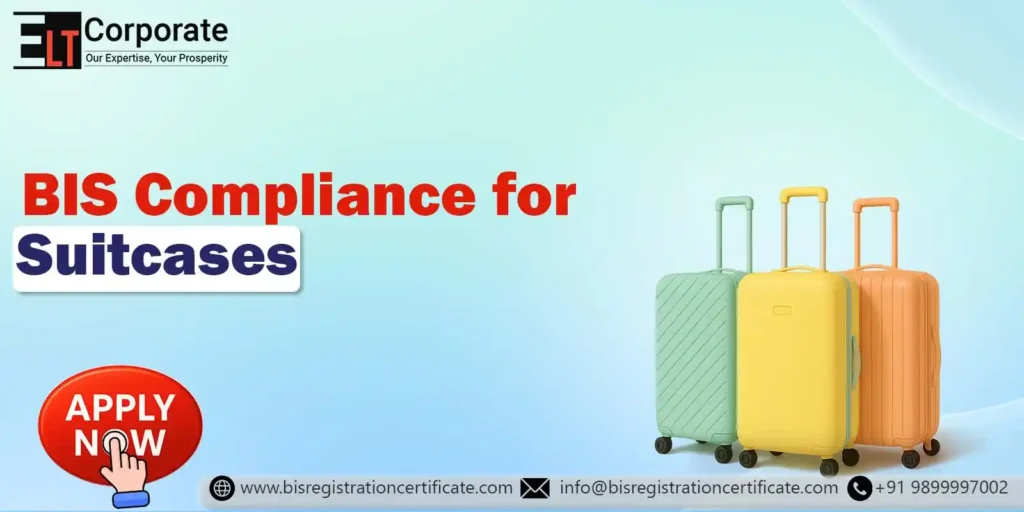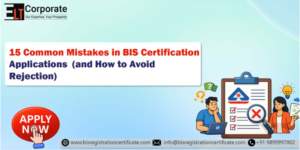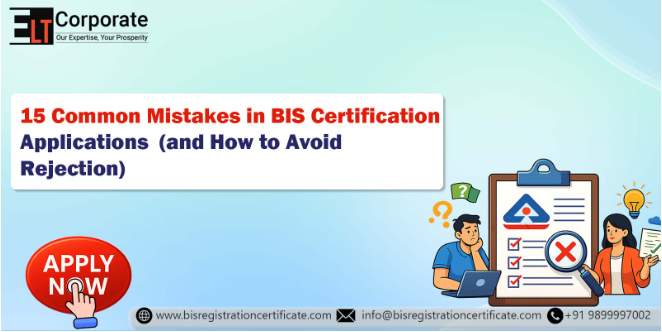Travel and logistics sectors rely heavily on suitcases, which makes consumer demand for durability, safety and quality standards critical. The Government of India, a through the Bureau of Indian Standards (BIS,) established quality norms for suitcases to ensure they meet prescribed standards for performance and longevity because of their mechanical use and exposure to wear and tear.
This article provides an in-depth exploration of the BIS certification for air travel suitcases, covering the applicable Indian Standards certification procedures, required documentation, and frequently asked questions (FAQs).
What is BIS Certification?
BIS certification operates as a quality conformity scheme that verifies that products meet applicable Indian Standards (IS). The certification establishes trustworthiness while verifying that the product aligns with quality, safety and reliability standards defined by the Indian government.
The necessity of BIS certification depends on specific product classifications and legal requirements, which dictate it as either mandatory under QCO regulations or voluntary.
Read More: Introduction To Bureau Of Indian Standards
Is BIS Certification for Air Travel Suitcases Mandatory?
As of now, BIS certificate for Travel Suitcases Mandatory is voluntary. There is no Quality Control Order (QCO) issued by the Ministry of Commerce or the Ministry of Consumer Affairs that mandates compulsory BIS certification for suitcases.
However, several suitcase manufacturers opt for voluntary BIS certification to:
- Boost consumer confidence
- Ensure product quality
- Gain access to institutional and government tenders
- Enhance brand reputation and export readiness
Applicable Indian Standard for Travel Suitcases Mandatory
| Product Category | Indian Standard | Title of Standard | Certification Status |
|---|---|---|---|
| Suitcases | IS 8518:1977 | Specification for Moulded Suitcases | Voluntary (ISI Mark) |
IS 5679:2022 is the updated Indian Standard that covers technical and quality requirements for moulded suitcases commonly made from thermoplastics, polycarbonate, ABS, and other polymers.
Scope of IS 8518:1977 – Specification for Moulded Suitcases
This standard lays down the quality and performance criteria for suitcases including:
- Material quality (plastic body, hinges, handles)
- Dimensions and permissible tolerances
- Mass and volume capacity
- Drop resistance
- Handle tensile strength
- Wheel performance
- Locking mechanism integrity
- Environmental resistance (temperature, impact)
- Marking and labelling requirements
It is applicable to hard shell, soft shell, cabin, and check-in moulded suitcases used for personal and commercial travel.
Benefits of BIS Certification for Air Travel Suitcase
Below, we mentioned BIS Certificate for air travel suitcase
- Demonstrates product quality and durability
- Improves brand credibility
- Eligible for institutional purchases and tenders
- Preferred by large distributors and e-commerce platforms
- Improves product marketability in India and abroad
- Builds consumer trust via ISI mark labeling
Step-by-Step Process for BIS Certification for Travel Suitcases Mandatory (ISI Mark Scheme)
Travel Suitcases Mandatory are certified under the ISI Mark Scheme (Domestic Manufacturer Certification Scheme). The process is outlined below:
Step 1: Identify Standard and Product Category
Confirm that the suitcase model complies with IS 8518:1977 in terms of materials, testing parameters, and labelling.
Step 2: Register on BIS Portal
Visit the official BIS Manakonline Portal and register your organisation. Apply using Form V under the ISI Mark Scheme.
Step 3: Product Testing
Send your suitcase samples to a BIS-recognized laboratory for testing against parameters such as:
- Drop and impact resistance
- Tensile strength of handle
- Rolling performance of wheels
- Structural rigidity and locking safety
Step 4: Factory Audit by BIS
The BIS officer visits your factory to evaluate:
- Manufacturing workflow
- In-house test lab equipment
- Quality control procedures
- Raw material sourcing and traceability
Step 5: License Grant
If your factory passes the audit and your product passes lab testing, BIS grants a license to use the ISI mark on your suitcases.
Read More: Process for getting BIS for Certification
Documents Required for BIS Certification for Travel Suitcases Mandatory
| Document Type | Details |
|---|---|
| Company Registration | Incorporation Certificate, GST, PAN |
| Manufacturing Facility Proof | Ownership or lease agreement, factory layout |
| Product Information | Technical drawings, user manual, photos |
| Internal Test Records | Quality test logs, SOPs, inspection formats |
| Lab Test Reports | Results from BIS-approved labs as per IS 8518:1977 |
| In-house Testing Capability | List of machines, calibration certificates |
| Authorised Signatory Proof | Board resolution, Aadhaar/passport, photo, letter of appointment |
Read More: Documents Required For BIS Registration
Cost Structure for BIS Certification
| Fee Category | Approximate Cost (INR) |
|---|---|
| Application Fee | ₹1,000 to ₹5,000 |
| Testing Fee | ₹25,000 to ₹50,000 (varies by parameters) |
| Factory Inspection Fee | ₹7,000 to ₹10,000 |
| Annual License Fee | ₹10,000 to ₹25,000 |
| Marking Fee (per unit) | ₹0.50 – ₹2 per suitcase (based on MRP and category) |
Prices may vary depending on production volume, product variants, and lab testing requirements.
Marking Requirements
Each certified suitcase must carry the following markings:
- ISI mark with license number (e.g., CM/L-XXXXXXX)
- Manufacturer name or registered logo
- Standard number: IS 8518:1977
- Batch number and manufacturing date
- Volume or size specification
These details must be either embossed, printed, or permanently affixed on the inner panel or handle of the suitcase.
BIS License Renewal & Surveillance
Though BIS certificate for suitcases is voluntary, once a license is granted, the manufacturer must comply with:
- Annual surveillance audits by BIS officials
- Market sample testing (surprise inspections may occur)
- License renewal every 1–2 years based on performance and compliance history
For renewal, you must submit:
- Updated internal test reports
- Sales and production records
- Payment of the renewal and marking fee
BIS for Imported Suitcases – FMCS Scheme
If you are importing suitcases into India and want to use the ISI mark voluntarily, you must apply under the Foreign Manufacturers Certification Scheme (FMCS). This includes:
- Appointing an Authorised Indian Representative
- Sending product samples for lab testing
- Allowing BIS audit in the foreign factory
- Complying with labelling and documentation norms
Role of Consultants in BIS Certification for Travel Suitcases Mandatory
BIS certificate for Travel Suitcases is a technical and documentation-heavy process. An expert consultant can assist with:
- Identifying the correct Indian Standard
- Preparing technical files and SOPs
- Coordinating with laboratories for product testing
- Ensuring audit-readiness
- Filing renewal or variant extension applications
This ensures that your certification journey is efficient, compliant, and free from errors.
How ELT Corporate Can Help You
At ELT Corporate, we specialise in providing end-to-end assistance for BIS certification of toothpaste, including
- Document preparation
- Lab coordination
- BIS portal submission
- Factory inspection support
- Liaison with BIS officials
Whether you are a domestic brand or a global exporter, we ensure fast-track BIS certification with complete legal compliance.
Get in touch with our experts today and simplify your certification journey!
Conclusion
Though not mandatory as of now, BIS certificate for Travel Suitcases Mandatory under IS 8518:1977 can significantly enhance a brand’s value, product reliability, and customer trust. As consumer demand for quality and standardised products increases, BIS-certified suitcases are likely to see greater acceptance in both domestic and global markets.
If you’re a manufacturer, private label brand, or exporter, pursuing BIS certification voluntarily is a forward-thinking decision that aligns with future regulatory expectations and buyer preferences.
Is BIS certification mandatory for soft fabric suitcases?
No, BIS certification is currently voluntary for all types of suitcases, including fabric and hard-shell variants.
Does BIS certification apply to trolley bags and briefcases?
Yes, if the design and usage fall under the scope of IS 5679, they may be included under voluntary BIS certification.
How long does it take to get BIS certification for suitcases?
The process typically takes 30 to 90 days, depending on testing duration, audit scheduling, and document readiness.
Can I apply for multiple suitcase variants under one license?
Yes, BIS allows multiple sizes or colours under a single license if they fall under the same product category and standard.
Is BIS certification required for suitcase exports?
No, BIS certification is not mandatory for exporting suitcases from India. However, some countries may prefer BIS-certified goods.









